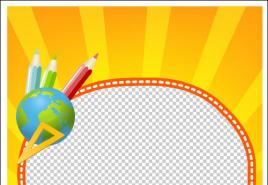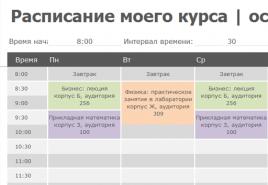Benefits to universities of the Olympiad. What is the GPA needed for admission? When to participate in the Olympiad
Many people these days choose email and instant messaging to communicate. Surely, many of you already feel nostalgic for paper letters. According to the feelings that accompanied us when we thoughtfully and diligently wrote interesting and witty letters.
Of course, emails are effective because sending and receiving them is instant. In business, words have become abbreviations, in everyday communication we often use abbreviations, paper and pen are gradually disappearing from our everyday life.
Fortunately, letters are still an integral part of language exams. In light of this, we should consider two types of writing - formal and informal. When writing a letter, it is important to remember who will be reading it (friend, family member, or potential employer), the main topics you want to describe, and any other information you think the reader needs to know. We will analyze the writing of informal letters.
Unofficial letter
We first need to look at the format and style of the informal letter. When designing it, we use abbreviated forms of verbs (I "m, I" ll etc.). Keep sentences and questions short and simple, and use simple communication schemes between them.
Some simple schemes:
- "But"
- "Because"
- "Also"
- "Then"
- "However", etc.
Yours should be written on the top right of the page with the date right below it. After skipping a line, the greeting begins on the left side of the page.
As a rule, it starts with "Dear ..." or "Hi ..."not followed by a comma.
The next paragraph - the beginning of the letter itself - should be written with a slight indent to the right. Here you need to contact the person you are writing to - "It was great to hear from you" or "Thank you for your letter, it was lovely to hear from you", you can also comment on the reason why they wrote to you. For example, if the person who wrote to you reported that he received a promotion or passed a very important test, you should congratulate him on this: "Well done on passing your test / getting that promotion ...".
In the second paragraph, you can write answers to those questions that you may have been asked in the letter - for example, to a request for an opinion or advice.
- Expressions used to substantiate your opinion: "In my opinion ...", "It" s my belief that ... ", "I definitely think that ..."
- Expressions used when providing advice or suggestions: "If I were you I would ....", "Why not try ...", "I suggest that ...", "You should perhaps ..."
After that, you, in turn, can ask several questions - for example, find out about something in more detail, or write about what is happening in your life.
Having stated everything that you wanted, let the reader know that your letter is coming to an end. You can use phrases like:
- "I look forward to hearing back from you soon"
- "Hope to hear from you soon"
- "Keep in touch"
When finishing the letter, you can sign in different ways, of course, taking into account the personality of the person you are contacting:
- "Best Wishes"
- "Sincerely (yours)"
- "(Lots of) Love"
- "(Best) Regards" etc.
The structure of both business and personal letters in English is about the same, however, more clear requirements are imposed on business letters. Of course, each letter is unique and therefore some elements can be omitted. Let's consider an approximate structure according to which a typical letter is written in English.
Sender's address and date of composing the letter.
It is written in the upper right corner. You must start writing the address with the apartment number, then the house. The rest of the address follows. For example:
16 Lenina street
Petersburg
03/06/17
When writing a date, you can use not only the above options, but also the following possible spellings:
- July 15th 2016
- 15 July 2016
- 15/17/16
Address of the recipient. Indicated in the same sequence as the sender's address.
Introduction. As a rule, here you should thank the sender for the letter, and also possibly apologize for the lengthy response. When writing a letter in English, you can use the following phrases:
- It's lovely to receive your letter – It's great to hear from you.
- I must apologize it took me so long to write a response – Sorry for writing for so long answer;
- I’m so pleased to know that – Nice to know that ...
The second or main part of the letter. This is the longest part, because it is in it that the author tries to answer all the questions that the sender asked him, as well as ask a few of his own. Here you should give the letter laconism, however, create fullness. It is sometimes appropriate to ask for advice using the following words and phrases:
- I would want to ask you to give me advice – I would like to ask you for advice;
- I'm in need of your advice – I need your advice.
Conclusion or third part. Here the author usually prescribes why he should end the letter, as well as that he is looking forward to hearing again. The following phrases are appropriate:
- That would be great to meet this summer. Write me if you already have any plans – It would be great to meet this summer. Write to me if you have any plans for him;
- Drop me a line – Write as there will be an opportunity.
End of letter. This part usually contains the name of the author, as well as the ending expressions. For example:
- Faithfully yours – With the highest respect (there is at the beginning you addressed the recipient using very polite constructions);
- Yours sincerely – Sincerely.
If you are writing to a person you are not yet familiar with, you can use constructs like best regards (best regards).
If the recipient is a close friend with whom you are in a more than warm relationship, then you can use cordially yours, What means "Warmly yours".
This is usually followed by a comma followed by your name. If the letter is official, then you can indicate the position and organization, eg:
Ivan Sidorov,
Accountant at LLS Company, Russia
Speech cliches
In writing in English, you cannot do without other template phrases. I use clichés both when writing a business letter and when passing the GIA or USE exam, you definitely won't be mistaken. Let's take a look at the most common clichés.
The following clichés are suitable for introductory sentences:
- Its cool to get / receive your letter – It's so nice to hear from you;
- It is great / nice / lovely to hear from you – It's cool to get a letter from you;
- Sorry it took me so long to write you back – Forgive me for writing you an answer for so long;
- I'm pleased to hear that – I am pleased to know that ...
If you ask for advice or, on the contrary, want to give it, then the following clichés for writing a letter will not hurt you:
- I would want to ask for advice – I want to ask you for advice;
- Could you give me advice – Could you advise me;
- I have a problem – I have a problem;
- I’d love to know your opinion about ... – I would like to know your opinion on ...;
- Hope to receive your advice soon – Hope to get some advice from you soon;
- Could you tell me your opinion about ... — Tell me what you think ..:
- Don’t worry! – Do not worry;
- Cheer up! – Chin up!
- I suppose you’d better ...– I think I can help.
- I were you I’d – If I were in your place I would… .;
If you apologize for something or say thank you, then the following phrases for writing a letter in English will undoubtedly come in handy for you:
- I've got to beg for pardon ... — I must apologize for… .;
- I promise I’ll never do it again – I promise it will never happen again;
- It will never happen again from my side – On my part, this will never happen again;
- I'm having a party next week, would you like to come – I have a party planned for next week, would you like to come?
4. In the last part of the letter, you can use the following closing phrases:
- Could you tell me more about your plans for this summer? I'd love you to visit me – Tell us more about your plans for this summer? I would so much like you to visit me;
- Thank you a lot for sharing with me…. – Thanks for sending me / sharing with me ...;
- Write me as soon as possible – I look forward to hearing from you soon;
- Send my regards to your ... — Say hello…
Sample letter
Below is an example of a personal letter with which you can compose a similar letter when passing the English exam of the GIA or USE.
16 Sverdlova street
Novosibirsk,
04/02/17
Dear Sam!
I’m so glad to hear from you so soon! I have to apologize it took me so long to write you back. I’ve been busy with my exams, now I’ve passed everything and finally can take a rest a bit.
I think you should visit Germany. Extreme sports make life fuller. Last summer I did mountain cycling and I did enjoyed it.
It’s great that Howard is going to stay with you for 2 weeks. What are you going to do?
I have to get back to work. Drop me a line when it's possible! Can’t wait to hear from you.
Sincerely yours,
Novosibirsk, Russia,
sverdlova street, 16
04.02.17
Dear Sam!
I'm glad to finally hear from you. I must apologize for not answering you for so long. I was busy with exams, but now I have already passed everything and can rest.
I think you should go to Germany. Extreme sports make our life brighter. You know, I rode a mountain bike last summer and it was really great.
Cool that Howard is going to stay with you for 2 weeks. What are you going to do?
I need to go to work. Write me a couple of lines as soon as possible. I can't wait for an answer from you.
Sincerely yours,
Julia

With the advent of e-mail, paper letters seem to have lost their popularity. However, you cannot do without them at all - until you need to write a cover letter for your resume, establish contact with a potential partner, or, for example, file a complaint with the bank.
In any of these cases, it is important that your letter has the desired effect on the addressee. For this, the letter must be:
- well-formed
- short and meaningful
- essentially written
- well written
- polite, even if it is a complaint or a claim
If you are replying to a letter, pay attention to how this letter is formatted and what expressions are used in it. In turn, try to meet the specified level both in the selection of verbal wording and in the formatting standards.
Business letter structure
In English, there are a number of rules to follow when writing a business letter. General advice: Try to write simply, clearly and concisely.
Address
The sender's address (without a name) is usually written in the upper right corner.
E-mail and phone number are not required here, but it is allowed.
The recipient's address is on the left, below the sender's address.
date
The date can be placed to the left or right below or above the recipient's address.
is also quite flexible. For example, "April 7, 2016" can be written as 7 April 2016, 7th April 2016, 7/4/16or 07/04/16
... But do not forget that in the US and the UK, dates are written differently (in the US, they first write the month, then the date: April 7, 2016). To avoid confusion, it is recommended to write the name of the month in words.
Appeal
- If you do not know the name of the addressee, use the appeal Dear Sir or Madam... But if there is such a possibility, try to find out the name of the addressee: this way it is much more likely that your letter will be paid attention.
- If you know the name of the addressee, use the appropriate contact form and last name. For example, Dear Mr Johnson - if the letter is addressed to a man; Dear Mrs Johnson - a married woman; Dear miss johnson - unmarried.
- Recently, many consider it incorrect to emphasize the marital status of a woman. If you are writing to a woman and do not know what kind of treatment she prefers, it is better to use the neutral form. Ms: Dear Ms Johnson
- If the addressee has an academic title, use it: Dear Dr. Huxley; Dear Prof. Atkinson.
Pay attention to the punctuation: in modern British English, there is no period after the Mr / Mrs / Ms forms, but a comma at the end of the address:
Dear Mr Smith,
In American English, a period is used after Mr / Mrs / Ms, and a colon at the end of the call:
Dear Mr. Stevens:
Make sure to spell the recipient's name correctly. Nothing spoils the experience like mistakes or typos in the name.
Completing the letter:
- If you don't know the recipient's name, end the letter with Yours faithfully.
- If you know the name, it is customary to end the letter with a phrase Yours sincerely.
- Your signature.
Leave a line for painting, below write your first and last name. In parentheses, you can indicate which treatment you prefer:
Olga Smirnova (Ms)
- The first paragraph should be short and reflect the purpose of the letter - request, complaint, proposal, etc.
- The middle paragraphs contain information that explains the purpose of the letter. It is customary to write business letters in English concisely, so try to state facts with restraint and to the point, avoiding unnecessary details.
- The last paragraph should indicate what actions you expect from the recipient - return the money for the goods, provide information, etc.

Business writing style
It is important to use the correct style and tone of language in business writing. Therefore, you should avoid:
- colloquial expressions, slang and jargon
- abbreviations (I "m; it" s; don "t, etc., use full forms)
- emotionally charged words - terrible (terrible), rubbish (nonsense), etc.
Always maintain a polite and respectful tone, even when writing a complaint or grievance. In English, the modal verbs would, could and should are often used to give formal speech. For example, instead of "Please send me ..." you can write "I would be grateful if you could send me ..." ("I would be grateful if you could send me ... ").
Try not to use (they are typical, rather, for a conversational style). Instead of go on, it is better to write continue, instead of turn down - decline or refuse.
Avoid cumbersome constructions and words whose meaning you are not sure about. Try to write in clear, non-ambiguous phrases.
10 most common mistakes in business letters
This video from Espresso English, a pure English service, lists ten common mistakes people make when writing business letters and suggests ways to fix them.
Preparation for the exam and exam
The average general education
UMK line by M.V. Verbitskaya. English "Forward" (10-11) (basic)
UMK line O. V. Afanasyeva, I. V. Mikheeva, K. M. Baranova. "Rainbow English" (10-11) (basic)
English language
We analyze the exam in English: section "Letter"
Analysis of the tasks of the "Letter" section with the teacher. Methodical tips, building the logic of the response, examples of writing and essays.Dzhalolova Svetlana Anatolievna, English teacher of the Highest qualification category. Winner of the competitive selection for the Moscow Grant in Education 2010. Senior expert of the GIA EGE in English. Winner All-Russian Olympiad teachers of the English language "Profi-edge" 2015. Certificate of honor of the Ministry of Education of the Russian Federation in 2014, Certificate of honor of the winner of the competition for the best teachers of the Russian Federation in 2007, Diploma of the winner of the competition for a Moscow Grant 2010. Work experience - 23 years.
Nedashkovskaya Natalia Mikhailovna, English teacher of the Highest qualification category. Winner of PNPO 2007. Winner of the competitive selection for the Moscow Grant in Education 2010. Expert of GIA OGE in English. Conducted a pedagogical examination of educational publications at RAO 2015-2016. Certificate of honor of the Ministry of Education of the Russian Federation in 2013, Certificate of honor of the winner of the competition for the best teachers of the Russian Federation in 2007, Diploma of the winner of the competition for a Moscow grant in 2010. Work experience - 35 years.
Podvigina Marina Mikhailovna, English teacher of the Highest qualification category. Winner PPPE 2008 Winner of the competitive selection for the Moscow Grant in Education 2010. Senior expert of the GIA EGE in English. Conducted a pedagogical examination of educational publications at RAO 2015-2016. Certificate of honor of the Ministry of Education of the Russian Federation in 2015, Certificate of honor of the winner of the competition for the best teachers of the Russian Federation in 2008, Diploma of the winner of the competition for a Moscow grant in 2010. Work experience - 23 years.
Trofimova Elena Anatolievna, English teacher of the Highest qualification category. Senior expert of the GIA EGE in English. Certificate of Merit of the Ministry of Education of the Russian Federation 2013. Work experience - 15 years.
39. Task 1.We proceed directly to writing. It is better to write the letter cleanly immediately: this will avoid wasting time and energy. To correctly formulate the answers to the questions, preliminary sketches can be made in the form of keywords that can be easily converted into a complete thought, for example:
Russian cuisine, healthy and delicious, pancakes and cabbage soup called shchi, pancakes
When preparing answers to questions, it is important to remember that your real opinion on this or that question does not matter on the exam. If you have forgotten how this or that is translated into English russian word, just answer the question differently, the main thing is that your answer sounds clear and believable. The beginning of the letter is the same for all letters, so you just need to memorize it. We write a short address in the upper right corner. There is no need to write the street and house number - no one will appreciate our wasted efforts. Plus, silly mistakes are possible. Let's just limit ourselves to Moscow, Russia (separated by commas) or without commas under each other.
We write the date under the address, just 04/17/17 (you can use words, but there is no need for this, and the risk of stupid mistakes increases). What follows is a typical homework for the first paragraph (let's first take a look at the assignment and remember the name of a friend):
Dear Stuart, (without a comma)
Thank you for your letter. I was very happy to hear from you again.
The second paragraph can also be started with a fairly typical, but, nevertheless, winning phrase, which will be a kind of "bridge" before moving on to the main part of the work.
In your letter you asked me some questions about the food I like (or the cuisine I prefer) and now I "m ready to answer them.
Take a quick look at our notes and answer the first question, which has two parts. For example, I prefer Russian national cuisine because it "s healthy and delicious.
There is no need to give long and lengthy explanations here. This can be done if you are sure that you are writing absolutely competently, have a good margin of time, and also that you will not exceed the established word limit. Otherwise, save your strength for the essay. The answer to the second question can be preceded by an introductory word, for example,
As for my favorite dishes, I love pancakes and cabbage soup called shchi.
And finally, the answer to the third question. Note that the question is simply about what kind of dishes you generally know how to cook, which means that the dishes must be mentioned. You can do this: Unfortunately, I can "t cook very well. I can only fry potatoes and make a sandwich.
Alternatively, you can link the answer to the previous statement: I can cook pancakes very well. Also I can fry potatoes.
Of course, we can say that we do not know how to cook at all: I can "t cook at all.
Thus, the second paragraph of the letter might look like this:
We take a look at the assignment and make sure we have answered all the questions asked. Now you can move on to the third paragraph: questions for a friend. You can start a paragraph with a pre-prepared phrase: Now I want to ask you some questions about the cooking camp.
Or you can just use the union by the way before the first question. For example, Woo the way, where is the camp located?
Now let's get down to the questions. According to the assignment, we must ask a friend about the culinary camp. To avoid a typical mistake (off-topic questions), you can simply ask questions where the word combination cooking camp will be the subject, for example, Where is it located? What facilities has it got? Is it a popular among teenagers? How big is the camp?
There is no need to try to ask different types of questions. The type of questions does not affect the score in any way. Please note: questions that are only indirectly related to the camp are not accepted. For example, Who recommended the camp to you? (It's not about the camp itself, but about where you got the information) How long are you planning to spend there? (This is more about the author's plans than about the camp).
The third paragraph might look like this: Now I want to ask you some questions about the cooking camp. Where is it located? What facilities has it got? How big is the camp?
We end the letter with standard phrases:
Write back soon.
Best wishes,
Misha
In the finished form, our work looks like this:
Thank you for your letter. I was very happy to hear from you again.
In your letter you asked me some questions about the food I like and now I "m ready to answer them. I prefer Russian national cuisine because it" s healthy and delicious. As for my favorite dishes, I love pancakes and cabbage soup called shchi. Unfortunately, I can "t cook very well. I can only fry potatoes and make a sandwich.
Now I want to ask you some questions about the cooking camp. Where is it located? What facilities has it got? How big is the camp?
Write back soon.
Best wishes,
Misha
Methodical tip
It remains to check. In order to do this in the most efficient way, I propose to introduce yourself in the place of an expert who will check the work. The first thing the expert will do is count the words. It can be very upsetting when a competent and interesting work loses points due to the fact that the author got too carried away and wrote too long a letter. It is important to remember that the maximum length of a letter should not exceed 154 words. If the letter is longer, then the EA counts 140 words, and everything else is ignored. Most often, in such cases, the author's signature, the final phrase, the mention of subsequent contacts, and even 1-2 questions are not taken into account. In this case, the author loses points for the content, and for the logic, and for the design of the letter. In our case, there are 109 words in a letter. The expert cannot have any complaints about the size of the letter. Next, we check the letter according to the criteria.
It is important to remember here that the work is evaluated according to three criteria: in terms of content, logic and language design. As for the content, we tried to verify everything by paragraphs. You can take another look at the assignment and the letter and make sure that it contains answers to all the questions asked (there is an answer to the question which national cuisine we prefer and why, an answer to a question about our favorite dishes and an answer to the question of what we can prepare). All three questions are about the camp. We did not forget to thank a friend for the letter, mention previous contacts, and express hope for the future. The letter contains the correct form of addressing a friend (by name), the correct final phrase and signature (name only). Thus, we have every chance of believing that the content rating will be the maximum (2 points).
We evaluate the logic and structure of the text. The text is competently divided into paragraphs (classic division: introduction, answers to questions in one paragraph, questions in a separate paragraph). Referral to a friend and author's signature on a separate line. There are linking words (and, because, as for) in the letter, and they are used appropriately. There are logical bridges between paragraphs, there are no violations of logic. The score for this criterion is 2 points (maximum). Thus, even with a very superficial knowledge of grammar and not having a large vocabulary, you can get at least 4 points out of 6 for this task, if you follow these simple guidelines.
The last criterion is language design. Here the most typical mistakes are the absence of an article before a countable noun in the singular (a sandwich), the word order in questions (must be reversed, except for dividing questions), the absence of auxiliary verbs in questions. Also, the endings -s are often forgotten in 3rd person verbs singular, plural endings of nouns.
You also need to check spelling. Some mistakes can be avoided by looking closely at the assignment. For example, the word cuisine can simply be written off from the assignment. Our task is to reduce the number of possible errors to a minimum, remembering that according to the criteria, if there are no more than two grammatical or lexical errors and / or spelling and punctuation errors, the highest score is given for this criterion (2 points out of 2).
40. Task 2. Essay expressing your opinion on the topic: "Playing videogames is a complete waste of time".
Just like a letter, it is better to write an essay immediately clean, having previously drawn up a detailed plan. The outline for the plan might look something like this:
|
Means of communication |
In addition to the "content" column, where we will write down ideas regarding what to write in the work, the plan must include the columns "vocabulary" and "communication". In the vocabulary column, we will write down interesting lexical units and expressions, which we later use in the essay. This is very important, because in an essay, unlike in writing, the vocabulary used is assessed. The column "communications" will contain the alliances needed to communicate our ideas logically. A detailed plan will allow us to think over the essay in advance, concentrate on important points and avoid drifting off the topic.
As for dividing the essay into paragraphs, it is better to follow the plan given in the assignment. In accordance with this plan, the problem must be stated in the first paragraph. It would be more logical to start your essay with an introduction to the topic, and then write about two existing views on this issue. The topic is what we will write about (in this case, we should write about video games). The problem is the existing disagreement on this issue. One of the opinions is given in the assignment, we will only have to rephrase it, i.e. express using other lexical means (synonyms, antonyms) or grammatical structures (other parts of speech, passive voice instead of real). Another opinion must be formulated accurately and accurately, making sure that it is directly opposite to the first. This is very important, as inaccurate formulation of opinions can subsequently lead to a departure from the topic.
Paragraph: Introduction
Content: Theme: playing videogames. Opinion 1: a waste of time. Opinion 2: a useful activity
Vocabulary: Nowadays, become popular, useless, leisure-time activity, a lot of benefits
Means of communication:Think, believe
The next paragraph should contain our own opinion on this issue and the arguments proving its correctness. Our opinion should coincide with either the first or the second opinion from the first paragraph. It is categorically impossible to write something compromising, for example: "It depends on the person," or "It depends on the video game that the person is playing." The essay requires you to stand on one side and defend your position. At this stage, we need to clearly define which opinion we will defend. Of course, nothing prevents us from writing what we really think on this issue. However, the most important question we will have to answer is the following: "Which of the positions is the easiest way for us to formulate arguments?" Sometimes argumentation on one of the positions looks much stronger and more interesting than on another, and it will be easier for us to defend this very point of view. When it comes to argumentation, remember that a strong argument has two parts: the idea and its proof. To prove an idea, you can use the following methods: give an example, refer to available statistics, explain the reason, or describe the consequences. In accordance with the plan, we have to bring 2-3 arguments. Experience shows that two arguments in this paragraph are quite enough, since we will need one more argument later to discourage the opposite opinion.
Paragraph:2 (my opinion and arg)
Content:Opinion: disagree (it is useful), arg 1: entertaining, reason: good plots, arg 2: helps make friends, statistics: popular activity
Vocabulary:Can hardly be called, gripping, good for uplifting, socialize, the majority of
Means of communication:In my opinion, firstly, this is because, secondly, according to statistics
Next, we proceed to the formulation of the opposite point of view and the argumentation of its supporters. It is important to remember that we are not writing about the pros and cons of video games, but about two opposing points of view on this lesson. The opposite point of view should be consistent with that stated in the introduction. Since we have given two arguments to defend our point of view, here one argument supported by evidence will be enough for us.
Paragraph:3 (opposing opinion + arg)
Content:Opinion: absolutely useless. Arg: not educational. Example: shooting, chasing
Vocabulary:A way to kill time, do not do any good, do not lead to developing skills
Means of communication:However, other people are convinced, they say, because
In the fourth paragraph, our task is to disagree with the opposite point of view and refute the argument given in the previous paragraph. It's worth starting with the fact that we disagree with the opinion of the opposite side, and then choose an argument that will repel the argument of the opponents.
Paragraph:4 (explain why we disagree)
Content: Arg: a lot of games, which teach players take decisions, coordinate their actions, consider possible solutions to the problem
Vocabulary:A lot of upsides, come in handy
Means of communication:Nevertheless, I still argue, for instance
Finally, we formulate a conclusion. The main thing in the fifth paragraph is to reaffirm the conviction that you are right. However, it will not be enough if we limit ourselves to just one sentence with a statement of our opinion. Much more interesting would be a conclusion containing a link to the opposite opinion and a proposal that summarizes our main arguments.
Paragraph: 5 (conclusion)
Content: My opinion
Vocabulary: Approve of, not only ..., but also, amusing, exciting
Means of communication:In conclusion, although, I am still in favor
Another erroneous approach when performing this task is to write an essay first in a draft, and then copy it into a clean copy. This is a very time-consuming job, there is often no time for this on the exam. In addition, rewriting often occurs in a hurry, which leads to numerous errors. It is much better to plan the essay by writing down the keywords, as we did. This way, as a result of detailed planning, we get a carefully thought out draft of the future essay, containing not only outline ideas, but also useful vocabulary. Unfortunately, many people skip this important stage of the work, believing that it takes too much time and effort, and it is much easier to write right away, without a preliminary plan. This kind of approach leads to various kinds of errors, such as drifting away from the topic, weak argumentation, logical errors... It happens that under the influence of stress, the author of an essay by the middle of the essay forgets what position he is defending, and switches to the position of the opponent. Correcting such errors in finished work takes significantly more time than planning.
Now, based on the blank, we are writing an essay. It should not be forgotten that the essay is written in a more formal style, one of the features of which is the absence short forms with an apostrophe (eg don "t). The finished work might look something like this:
Nowadays playing videogames is becoming a popular leisure-time activity. Some people think that it is a useless way to spend free time. Others believe that this hobby has got a lot of benefits.
In my opinion, videogames are worth playing. Firstly, they are very entertaining and can be used for uplifting. This is because their plots are often gripping and one cannot help feeling amused playing them. Secondly, this activity helps people socialize. According to statistics, videogames are enjoyed by the majority of teenagers, which means that adolescents can easily make friends among those who share their interest.
However, other people are convinced that playing videogames is just a way to kill time. They say that videogames are not educational and do not do any good because most games are based on chasing or shooting which do not lead to developing any useful skills.
Nevertheless, I still argue that videogames have got a lot of upsides. Plenty of modern videogames help develop different skills which will come in handy in real-life situations. For instance, one can practice taking decisions in stressful situations, or coordinating their actions with actions of other players, or considering possible solutions to various problems which they face in games.
In conclusion, although there are people who do not approve of playing videogames, I am still in favor of this pastime activity. Not only are they highly amusing and exciting but also make people more skillful in certain spheres.
After finishing the work, you need to count the number of words. The minimum allowed number of words is 180 (minus 10% of the lower limit indicated in the assignment), and the maximum allowed 275. The resulting essay contains 242 words, which indicates the correct preliminary planning of the work. After counting the words, you need to check the work in terms of grammar and spelling.
The article offers you clichés and phrase templates to help you write a letter in English.
In the modern world, few people do not know English, because it is international and compulsory for study in schools, technical schools and universities. English is useful to everyone when traveling, in professional activity and in cases of communication with foreigners.
IMPORTANT: Social networks have swallowed up the whole world and no one is surprised by a letter that came from "the other end of the world." The tips offered in this article will help you to start a conversation with a person and write a letter correctly. Here you will find examples of introductory and general phrases, greetings and goodbyes.
It can be very difficult to start a letter. It is important to choose beautiful words, to interest your interlocutor and win him over. It doesn't matter who you turn to, a friend, friend, boyfriend or girlfriend you like, distant relative, the main thing is to know common appealswho like universal cliché, are suitable for any letter.
Like any letter, a letter in English should have three main parts:
- Welcome and introduction
- Main (main) part
- The final part, goodbye




Phrases for writing to a friend, girlfriend in English: a list with translation
It doesn't matter what the essence of your letter will be, whether it is a letter of recognition, greeting, farewell or invitation. You should fill it with general phrases that will allow you to clearly state all thoughts and words. Take advantage of the established clichés suggested in this article.






How to finish a letter in English to a friend, girlfriend: rules
The letter should also be finished beautifully, using farewell phrases. You should thank your interlocutor for the letter sent or write that you are looking forward to hearing from him.


How to properly draw up a letter to a friend, girlfriend in English: a template for a ready letter
Ready-made examples will help you write a letter correctly and beautifully, where you can follow the use of all introductory phrases and use your own by this example.
Examples of ready-made letters:






How will "Sincerely" be in English in a letter to a friend?
Your signature at the end of the letter is a characteristic that will not only testify to your good manners, but also that you know all the rules for writing the correct letter.




An example of a letter to a friend, girlfriend in English with translation
Use examples of letters in English, which are provided with translations only. This way you can target the introductory clichés and know exactly what they mean.







